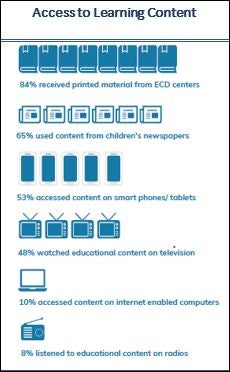 hand washing
hand washing
COVID-19 has resulted in the worst health, social and economic crisis of our time. From the loss of life and its impact on communities, to the widespread economic instability and job loss, the devastating impacts of the pandemic are being felt across borders, sectors, and age groups. For the youngest members of our society, the pandemic has resulted in considerable upheaval. The prolonged closure of pre-schools and childcare centers, the shift to online education, the limited access to routine medical services, and the isolation from friends and family has increased vulnerability and stifled opportunities for child growth and development. Given the importance of the early years in human development, it is likely that the impact of these losses will be felt for generations to come. As we make our way through the seemingly endless list of COVID-19 variants, we are left with little choice but to accept and adapt to a new normal. In doing so, we must now focus on mustering the support to rebuild and recover.
In Sri Lanka, the World Bank has collaborated with the State Ministry of Women and Child Development Pre-Schools & Primary Education, School Infrastructure & Education Services (SMWCD) and the MARGA Institute to obtain a more holistic understanding of how the pandemic has affected child development outcomes and the provision of Early Childhood Development (ECD) services in the country. A telephone survey carried out in August 2021 across all nine provinces of the country captured the views and experiences of primary caregivers, ECD teachers, and ECD officers. It covered different aspects of child development ranging from health and nutrition deficits to behavioral changes and losses in cognitive and non-cognitive skill development.
The survey showed that in many parts of the country the pandemic has disrupted routine healthcare services, leading to delays in child vaccinations, check-ups, and nutrition support programs. Overall, 22 percent of caregivers indicated that their children have missed clinic appointments due to the pandemic. Many children also missed out on nutritional supplements and support provided by the government. The data suggests that children may have experienced food security challenges during the pandemic. Approximately 10.7 percent of surveyed families received the emergency support dry ration pack given by the government and 19.7 percent of families took loans for consumption purposes. For a country that was already grappling with childhood stunting and malnutrition, the consequences of these disruptions will be significant and are likely to be amplified by broader socio-economic issues including the rising cost of living.
Teachers also noticed behavioral changes in children, which in some cases could be a red flag. In general, teachers observed decreased activity and skill use, and also noticed increased impatience, anger, and less camaraderie among children. Following extended periods of isolation and limited social interaction, teachers felt that some children have become quieter and more reserved. Many of these concerns were shared by caregivers who felt that their children have missed out on valuable time in school. “My child misses preschool so much. She makes me dress up like a teacher, and she dresses up in her school clothes, and we pretend that we are in preschool. She insists on this. Otherwise, she refuses to do her schoolwork,” said one parent from the Monaragala District.
On a more positive note, the findings indicate that most children have accessed learning material through various channels: 94 percent of caregivers said they maintained communication with teachers or community volunteers, and 80 percent of ECD teachers had taken steps to provide material and instructions to caregivers. Around 47 percent of teachers had visited children’s homes to provide support, and 63 percent of urban sector teachers, 33 percent of rural sector teachers, and 11 percent of estate sector teachers had used online platforms or mobile apps while ECD centers were closed.
Though not representative of the country’s overall situation, these findings do provide some indication of the pandemic related developmental losses in children from the rural, urban and plantation regions. They reveal gaps in service provision, particularly related to the challenges and lack of infrastructure and facilities for online education. They also highlight the difficulties faced by ECD professionals and the financial challenges and job losses within the sector which could affect the service provision capacity in the country.
This information can serve as a starting point for remedial action and provide a basis for the prioritization of interventions. In the short term it is necessary to ensure that all children continue to have access to early education. In addition, the implications on child nutrition suggest the need for urgent remedial action to prevent further damage and to reverse the negative impacts on child health and nutrition status. In the long-term, further action may be necessary to revive the ECD sector by providing necessary support to vulnerable centers and ECD professionals. Exploring alternative approaches for the provision of early years services may be needed to recover from the massive development losses, and to remediate, catch up and build back better.
Given that the early childhood years form the foundation of human capital development, ECD and the ECD service sector must be given due priority in the post pandemic recovery process. Targeted attention is needed to improve and strengthen children’s health and nutrition status, care and well-being, and cognitive and non-cognitive skill development. Let’s commit to action to develop robust and resilient systems to support Sri Lanka’s littlest citizens.




Join the Conversation